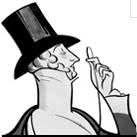
Ten Trillion and Counting
"Let's imagine a scenario where the politicians would love to keep the government going, but they can't because no one will lend us money." -Greg Ip
"I was happy to be fired at the end of November, 2002. I didn't want to be a part of something that I thought was fundamentally wrong." -Paul O'Neill
"We borrowed money from China, to give tax cuts to the best off people in our society and leave our kids paying the bill for a war we chose to fight - that was really unprecedented." -Matt Miller
"One of the largest tax cuts in American history was passed with Dick Cheney casting the deciding vote."
"The prescription drug benefit will go on forever; in the end, it's more expensive than the war in Iraq."
"During his first five years as president, George Bush never vetoed a spending bill."
"Fiscal conservatives in his (George Bush's) own party accused him of being the biggest spender since World War II."
"The future is clouded by one inescapable fact: more Americans are living longer and as they age, the government is obligated by law to spend more and more."
"The national debt will double in 8 years."
"You can get away with over-borrowing and saving nothing for decades, but then when it goes wrong, you're in trouble - big trouble - very quickly, and it's hard to get out of." -Clive Crook
"Meanwhile, in the first 3 months of this year, the US government has borrowed another $493 billion dollars."
Debt and the Bush Years
David Wessel (The Wall Street Journal):
President Bush got a lot of ridicule for saying what everybody should do after 9/11 is go shopping. I'm a little less harsh on that than some people, because I think one of the things that he was saying is we have to lead a normal life; we can't let the terrorists scare us into hiding under our beds.
But in retrospect, it was one of those signals to Americans that you can spend your way out of everything. Go get your credit card, go get another mortgage, and go and spend and spend and spend. There was never any attempt during the Bush presidency to slow that down.
The president declared, for instance, that it was his goal that every American should own a house. Well, every American shouldn't own a house. Some people don't make enough money to pay a mortgage and maintain a house, and they should rent. And they shouldn't be made to feel that there's something un-American about not having a mortgage.
But the pressure to lend and to get a mortgage was so great that we ended up lending to a lot of people who couldn't afford the mortgages. And they couldn't pay them back, and now they lost their house.
Blogging the Stimulus Bill by Steve Coll
ShovelWatch
Tracking the stimulus from bills to building.
The Tyranny of Dead Ideas
From Publishers Weekly:
If Fortune columnist Matt Miller's eerily prophetic book had come out earlier, it could have served as a wakeup call for Wall Street leaders and Washington, D.C. lawmakers before the failure of several venerable financial institutions required government bailouts. The author's prescient observations make a persuasive case for how an American attitude of entitlement and outdated beliefs about government, education, taxes, business, corporate excess and health care threaten our national well-being and our position as a world leader. The author denounces such cherished and longstanding beliefs as Your Company Should Take Care of You, and The Kids Will Earn More than We Do, and examines their historical provenances—for example, he traces the adoption of pensions to the early 20th century, when employers like Proctor and Gamble and G.E. acted as feudal lords offering benefits to recruit and retain employees—strategies that are now strangling these same corporations at the expense of global competitiveness. Rather than a petulant indictment of our political and economic myopia, this book offers a fair-handed critique.







